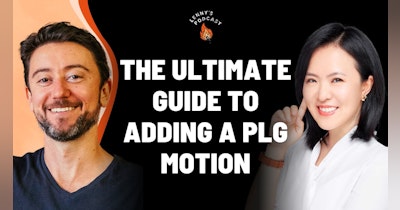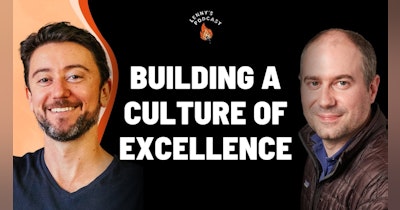Gustaf Alströmer is a Group Partner at Y Combinator, where he has worked with over 600 startups. He’s also a fellow Airbnb alumnus along with Lenny and started the original Airbnb growth team.
If I drill down what makes companies fail, it’s quite simple. It’s just like they don’t talk to users, which means they don’t find product-market fit. And if they don’t find product-market fit, nothing else really matters. What mistakes people make is all about that. It’s all about talking to customers and learning that you’re building something that’s actually useful. YC Slack headline is “Make things people want,” and it’s still true and it’s always going to be true.
You can also see the episode transcript and Gustaf’s references.
What made Airbnb so special? ▶️
- Airbnb felt like a group of friends with a special bond working on a project rather than a job. Folks were diverse, including former founders and people outside the technology industry, which contributed to better decision-making and a YC-like mindset.
- The most important thing Airbnb looked for in early hires is how excited they were to be there. The second thing was to understand their true motivations and make sure they mapped to the company’s core values. Airbnb did this through “culture interviews.”
https://twitter.com/gustaf/status/1580330162725347330
Motivations for starting companies ▶️
- “I disagree with Elad Gil that starting up is an act of desperation; most founders start from a positive place.”
- Motivations can be diverse: solving technical problems, proving oneself, having a grand mission, or simply wanting to be successful. Motivation doesn’t necessarily determine success, and we have seen motivations change over time, e.g. just running the company and enjoying the process of building something big, even if the idea is not grand or shiny.
- Being clear on the motivations also improves conflict resolution and self-awareness among co-founders.
- Don’t start a company as a career step: If you’re successful, it will most likely be your entire career, and if it’s not successful, that’s not something you generally aspire to.
- Consider personal constraints: Startups are hard, so don’t do it if you have financial, family, or relationship constraints that are more important.
The magic that happens at YC Office Hours ▶️
YC Office Hours come in two types: Regular Office Hours (one-on-one) and Group Office Hours (with multiple startups).
Regular Office Hours key question: “What’s holding you back from moving faster?”
Group Office Hours key question: “What are your goals for the next two weeks and what were your goals for the last two weeks? Did you hit the goals? If not, what came in the way of hitting the goals?”
- Addresses the loneliness of the founders by allowing them to lean on others who share similar problems and anxieties.
- Creates accountability by having founders share their goals and progress every two weeks.
Founders in coworking spaces should schedule time to talk, because by default they end up working by themselves with headphones on and no time for interaction. YC’s best experiences were in person, with everyone paying attention to each other without distractions.
Common reasons startups fail ▶️
- Failing to find product-market fit because they don’t talk to customers:
Often because they think software is the solution to everything, or because they’re afraid of rejection. Ninety percent of customers are not early adopters, so they’re not incentivized to take risks and try something new, and you need to reach out to 10 customers to be able to find that one.
External validation (e.g. investments, praise) is often confused with product-market fit, leading to neglect of customer input. One of the most important moments in Airbnb history was Paul Graham asking the founders of Airbnb, “Where are your customers?,” to which they said, “Oh, they’re in New York,” and Graham responded, “So why are you talking to me and not in New York right now talking to them?”
2. Lacking technical knowledge: Startups need technical founders who can build the first prototype.
The importance of solving pain points and why you should watch users ▶️
- Founders fear that users will try their product and hate it, but the most common thing that happens is the user is indifferent. So if you make improvements and come back after a while, they’ll always give you a second chance. Airbnb started with air mattresses and iterated from there, and Brian Chesky continues to do that today.
- Don’t ask users if something is working—watch them do it. That will give you a much better sense of their pain points.
The value of having a technical co-founder ▶️
- Having an idea and trying to find technical co-founder to build it is like having an idea for a song and looking for a musician to make it. Engineering is really hard and valuable.
- Start by asking the best technical people you know if they’re interested in starting a company with you, or ask for introductions to others. Many successful startup founders also learn how to code.
- Contracting an engineering team to build the product doesn’t really work because you can’t spec your way to a great product; you have to be part of the iterations.
Calendly’s success story: A Ukrainian dev team built their first product and drove initial growth by using it within their firm and spreading it to others.
Attributes of the most successful founders ▶️
- They’re determined to win and don’t give up when things get hard.
- They’re generally technical.
- They figure out how to talk to users and make progress, not waiting for permission.
- They have excellent communication and storytelling skills.
YC is not very good at predicting which startups will be the monster hits, but they’re good at identifying what failure looks like and advising against it. One good indicator, though, is if every Office Hours there are new things to talk about (progress on a weekly timescale).
Are successful founders more focused on...?
Speed vs. quality: It’s a false choice. If you know what the customer wants, you’ll come up with something that’s high-quality and move fast.
Confidence vs. humility: Successful founders need both to motivate and attract employees, investors, and customers.
Execution and tactics vs. strategy: Execution is most important pre-product-market fit, while strategy comes into play afterward, where multiple tasks can be tackled simultaneously.
Autocratic vs. collaboration-driven: In early-stage startups with small teams, autocratic decision-making is not feasible. Be willing to adhere to the agreed-upon process.
Cares more about product vs. distribution: Early-stage founders should care more about product (from the user’s perspective, not the founder’s), but the growth mindset is very useful when something is working.
On climate tech ▶️
- Gustaf and David Rusenko (CEO of Weebly) wrote a request for startups in climate tech with a detailed list of ideas and areas of opportunity, and have invested in over 130 companies. It’s not just about doing good for the world; it has strong economic incentives as well, Tesla being a good example.
- Software founders are realizing their skills are relevant in addressing climate change. What’s needed are core PM and engineering skills, not necessarily deep scientific knowledge or domain expertise.
- Decarbonization and carbon removal require changes in transportation, energy, and home heating.
- In shipping, Seabound focuses on carbon capture and removal for ships, while Fleetzero builds electric ships. Carbon accounting and recommendation systems help companies track and reduce emissions like Unravel Carbon (Singapore), Carbon Chain (U.K.), and Sinai (Bay Area). Enode is building a software platform for EV chargers and home energy systems, similar to Plaid. Statiq is the Airbnb for EV charging in India, creating a bottom-up EV charging system and platform. Aviation startups include Heart Aerospace and Right Electric, which focus on battery electric planes for commercial aviation.
- Climate tech is a profitable market, with battery prices and solar costs decreasing and wind power increasing. In the past 12 months: 1. Political change: In the U.S., the Inflation Reduction Act supports green energy and onshoring supply chains for the green economy. 2. Corporations as customers: Fortune 100 companies now invest in decarbonization solutions due to pressure from shareholders, governments, and public promises.
Lightning round ▶️
1. Favorite book? The 100% Solution, by Solomon Goldstein-Rose for climate change. Also, Without a Doubt, by Surbhi Sarna.
2. Favorite movie/show? Emily in Paris and Everything Everywhere All at Once.
3. Favorite interview question with YC? “What have you done since you applied to YC for your product?”
4. Most out-there wild startups you have funded? Heart Aerospace.
5. What’s a pro tip for applying to YC? Watch YouTube videos about hacking the application from other founders and reach out to them.
6. What’s one pro tip for visiting Sweden? Go during summer, explore the wild nature, and be prepared for a different social vibe compared to the U.S.
<iframe width="560" height="315" src="https://www.youtube.com/embed/6lY9CYIY4pQ?si=Cs3S9IuNwh1zeBR7" title="YouTube video player" frameborder="0" allow="accelerometer; autoplay; clipboard-write; encrypted-media; gyroscope; picture-in-picture; web-share" allowfullscreen></iframe>
This is a human edited summary of the podcast episode with Gustaf, by Gaurav Chandrashekar (@cggaurav, productscale.xyz). To listen to the full episode, go here.








